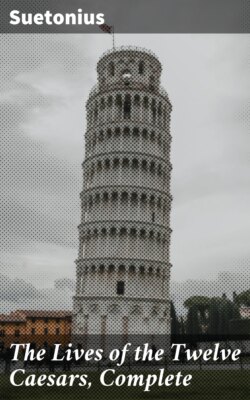Читать книгу The Lives of the Twelve Caesars, Complete - Suetonius - Страница 8
На сайте Литреса книга снята с продажи.
ОглавлениеIlle mi par esse Deo videtur,
me, etc.
This ode is executed both with spirit and elegance; it is, however, imperfect; and the last stanza seems to be spurious. Catullus’s epigrams are entitled to little praise, with regard either to sentiment or point; and on the whole, his merit, as a poet, appears to have been magnified beyond its real extent. He is said to have died about the thirtieth year of his age.
(69) Lucretius is the author of a celebrated poem, in six books, De Rerum Natura; a subject which had been treated many ages before by Empedocles, a philosopher and poet of Agrigentum. Lucretius was a zealous partizan of Democritus, and the sect of Epicurus, whose principles concerning the eternity of matter, the materiality of the soul, and the non-existence of a future state of rewards and punishments, he affects to maintain with a certainty equal to that of mathematical demonstration. Strongly prepossessed with the hypothetical doctrines of his master, and ignorant of the physical system of the universe, he endeavours to deduce from the phenomena of the material world conclusions not only unsupported by legitimate theory, but repugnant to the principles of the highest authority in metaphysical disquisition. But while we condemn his speculative notions as degrading to human nature, and subversive of the most important interests of mankind, we must admit that he has prosecuted his visionary hypothesis with uncommon ingenuity. Abstracting from it the rhapsodical nature of this production, and its obscurity in some parts, it has great merit as a poem. The style is elevated, and the versification in general harmonious. By the mixture of obsolete words, it possesses an air of solemnity well adapted to abstruse researches; at the same time that by the frequent resolution of diphthongs, it instils into the Latin the sonorous and melodious powers of the Greek language.
While Lucretius was engaged in this work, he fell into a state of insanity, occasioned, as is supposed, by a philtre, or love-potion, given him by his wife Lucilia. The complaint, however, having lucid intervals, he employed them in the execution of his plan, and, soon after it was finished, laid violent hands upon himself, in the forty-third year of his age. This fatal termination of his life, which perhaps proceeded from insanity, was ascribed by his friends and admirers to his concern for the banishment of one Memmius, with whom he was intimately connected, and for the distracted state of the republic. It was, however, a catastrophe which the principles of Epicurus, equally erroneous and irreconcilable to resignation and fortitude, authorized in particular circumstances. Even Atticus, the celebrated correspondent of Cicero, a few years after this period, had recourse to the same desperate expedient, by refusing all sustenance, while he laboured under a lingering disease.
It is said that Cicero revised the poem of Lucretius after the death of the author, and this circumstance is urged by the abettors of atheism, as a proof that the principles contained in the work had the sanction of his authority. But no inference in favour of Lucretius’s doctrine can justly be drawn from this circumstance. (70) Cicero, though already sufficiently acquainted with the principles of the Epicurean sect, might not be averse to the perusal of a production, which collected and enforced them in a nervous strain of poetry; especially as the work was likely to prove interesting to his friend Atticus, and would perhaps afford subject for some letters or conversation between them. It can have been only with reference to composition that the poem was submitted to Cicero’s revisal: for had he been required to exercise his judgment upon its principles, he must undoubtedly have so much mutilated the work, as to destroy the coherency of the system. He might be gratified with the shew of elaborate research, and confident declamation, which it exhibited, but he must have utterly disapproved of the conclusions which the author endeavoured to establish. According to the best information, Lucretius died in the year from the building of Rome 701, when Pompey was the third time consul. Cicero lived several years beyond this period, and in the two last years of his life, he composed those valuable works which contain sentiments diametrically repugnant to the visionary system of Epicurus. The argument, therefore, drawn from Cicero’s revisal, so far from confirming the principle of Lucretius, affords the strongest tacit declaration against their validity; because a period sufficient for mature consideration had elapsed, before Cicero published his own admirable system of philosophy. The poem of Lucretius, nevertheless, has been regarded as the bulwark of atheism—of atheism, which, while it impiously arrogates the support of reason, both reason and nature disclaim.
Many more writers flourished in this period, but their works have totally perished. Sallust was now engaged in historical productions; but as they were not yet completed, they will be noticed in the next division of the review.
